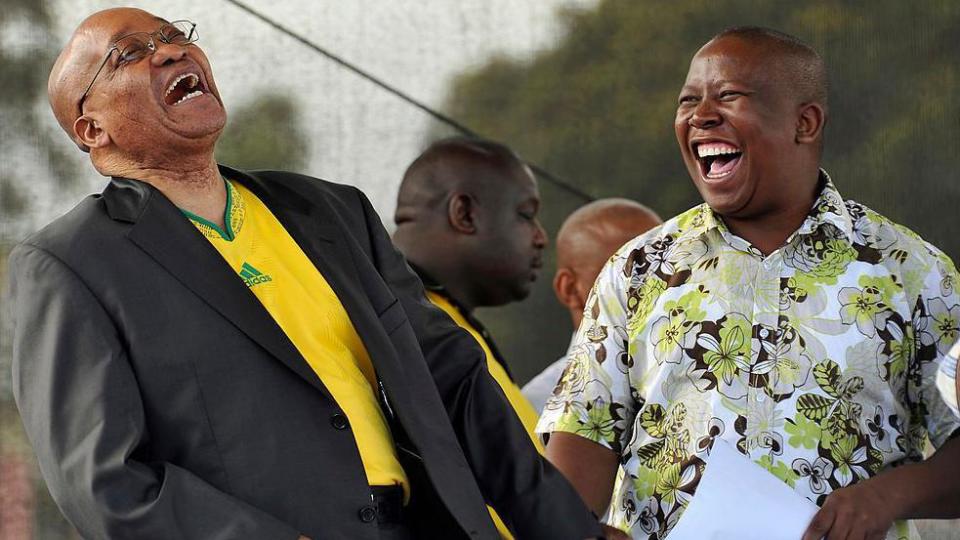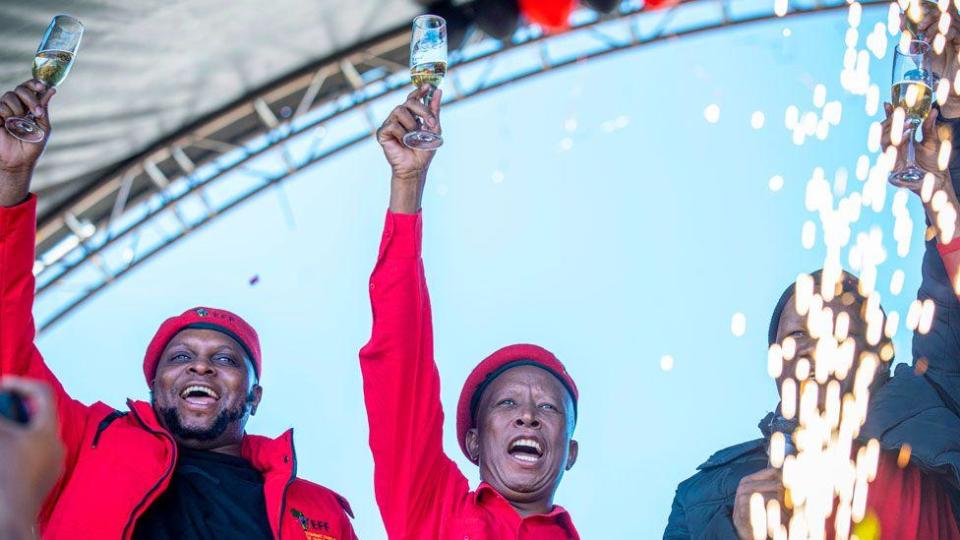The Economic Freedom Fighters (EFF) have been a major player in South Africa’s political landscape for over a decade. The party has been shaken to its core after deputy leader Floyd Shivambu defected to former President Jacob Zuma’s new party, uMhkonto weSizwe (MK), or Spear of the Nation.
Shivambu was seen as the EFF’s ideological guru, while party leader Julius Malema took on the role of commander-in-chief – or “shouter-in-chief”, as his critics called him – with his fiery rhetoric demanding the nationalisation of white-owned land and mines and the “decolonisation” of education.
The duo appeared to be a winning team, with the EFF gaining the support of South Africa’s growing youth population, frustrated by the slow pace of political and economic reform since the end of the racist apartheid system in 1994.
But the EFF suffered a major setback in the general election in May. Instead of achieving its goal of rising from the third to the second largest party in the country, it fell to fourth place.
MK proved to be her political nemesis – just as it was for the ruling African National Congress (ANC) – by winning votes from both parties to take third place in the first election they contested.
“MK cannibalised the ANC and took votes from the EFF. It changed the course of South African politics, causing the ANC to lose its parliamentary majority for the first time since 1994,” William Gumede, an academic from Wits University’s School of Governance in Johannesburg, told the BBC.
Mr Shivambu read the political tea leaves and defected to the MK last week, causing the biggest rift within the EFF since its inception 11 years ago.
For Malema it was a personal blow because the two, as young men full of political energy, had jointly founded the EFF after the ANC – ironically led by Zuma at the time – had excluded them.
They had questioned the authority of a president who clung to traditional values such as respect for elders and were expelled from the party after being accused of sowing division and bringing the party into disrepute.

“The EFF took almost the entire youth wing of the ANC with it and dominated student politics on campuses across South Africa, such was its appeal to young people,” said Paddy Harper, a journalist with the South African newspaper Mail & Guardian.
“Malema had the charisma to garner support, and Shivambu the intelligence to give it ideological direction,” he told the BBC.
“With their split, the EFF will enter a period of unrest. This will be felt across South Africa, from campuses to parliament, as the EFF tries to avoid losing more support to MK.”
However, political analyst Moeletsi Mbeki said the split would actually “strengthen” Malema’s position within the EFF as he would no longer face a “potential threat” to his power.
“The EFF is seen more as a cult, run by Malema. In such a system, the leader is the leader. Full stop. Anyone who appears to be close to the leader ultimately becomes a victim,” he told the BBC.
The first public sign that the relationship was in trouble came last year, when Malema paid glowing tribute to Shivambu, describing him as a thinker and warning him against plotting against him.
“I am ruthless with people who do such things to me, so never try that with me,” Malema reportedly said at a gala dinner.
With Malema set to run again as party leader at the EFF congress in October, it appears Shivambu, 41, has decided it is time to move on.
MK has appointed him as national organiser, a demotion from his role in the EFF, but still a senior position with responsibility for the growth of the party.
But, Mr Harper said, it was unclear how he would get along with Mr Zuma, given their past feud and the fact that the former president was also a cult-like figure in MK who repeatedly appointed and fired officials. The party has had three secretaries-general in less than a year.
“But there is also the view that the party still needs to find its feet and stabilise with its core leaders, including Zuma, John Hlophe, the ousted judge who has been appointed as his deputy, and Shivambu,” Harper said.
Another reason that could have prompted Shivambu to defect is that he and Malema – despite their public image as socialists and African nationalists – were at the centre of a major corruption scandal, he added.
They are accused of receiving about R16 million (US$9 million; £7 million) in “gratuity” (to put it simply, bribes) from the boss of a now-liquidated bank after meeting him in a penthouse in an upmarket Johannesburg suburb in 2017.
The accusation was made in a recently leaked witness statement by the bank’s disgraced boss, Tshifhiwa Matodzi, after he pleaded guilty to 33 counts of corruption, theft, fraud, money laundering and extortion over his involvement in what investigators called a “bank robbery”.


Both Mr Shivambu and Mr Malema deny any wrongdoing, but with a police investigation underway and their political rivals likely to keep up the pressure, the scandal is unlikely to go away anytime soon.
“It is the biggest corruption scandal to ever hit the EFF. If the party should be making anyone its sacrificial lamb, it is Shivambu, and certainly not Malema,” Harper said.
“So his move to MK makes sense because it gives him more protection. It’s a bigger party full of people accused of corruption – including Mr Zuma himself.” The former president has denied any wrongdoing.
MK was also a logical political home for Shivambu, as its economic policies are similar to those of the EFF. Both parties advocate the expropriation of white-owned land and state ownership of mines and banks. These policies were adopted by many African countries after independence, but were abandoned around the time of the fall of the Soviet Union more than 20 years ago.
“MK and EFF represent the old nationalist politics of Africa. They are totally out of touch with reality,” Mr Mbeki said.
“State-owned enterprises in South Africa are huge, but they are collapsing due to mismanagement. For the working class, this means a loss of jobs,” he added.
Prof. Gumede expressed a similar view, saying that the EFF had failed to gain a foothold in the South African trade union movement despite being in existence for over 10 years.
“Whether they are working class or middle class, older voters see the EFF as a symbol of chaos and confrontation. They want parties to work together to solve South Africa’s problems, because we have an electricity and water crisis, high unemployment and crime,” said Prof. Gumede.
This was the clear message of the election, he added, but both the EFF and MK had made a “strategic mistake” by not joining the government of national unity formed by President Cyril Ramaphosa after the election.
Mr Harper said MK had performed poorly in by-elections in Zuma’s political backyard KwaZulu-Natal since the general election.
“It is not in government and all it has done is oppose the coalition government in the province. That is not what voters want. They want basic services delivered,” he said.
“As for the EFF, the ANC is currently in the process of dumping it as a coalition partner in cities like Johannesburg. So that too is left out in the cold.
“Logically, the EFF and Parliament should strengthen their relationships to offer voters a viable alternative, rather than competing with each other for members and voters,” Harper said.
More South Africa stories from the BBC:


Go to BBCAfrica.com for more news from the African continent.
Follow us on Twitter @BBCAfricaon Facebook on BBC Africa or on Instagram at bbcafrica




